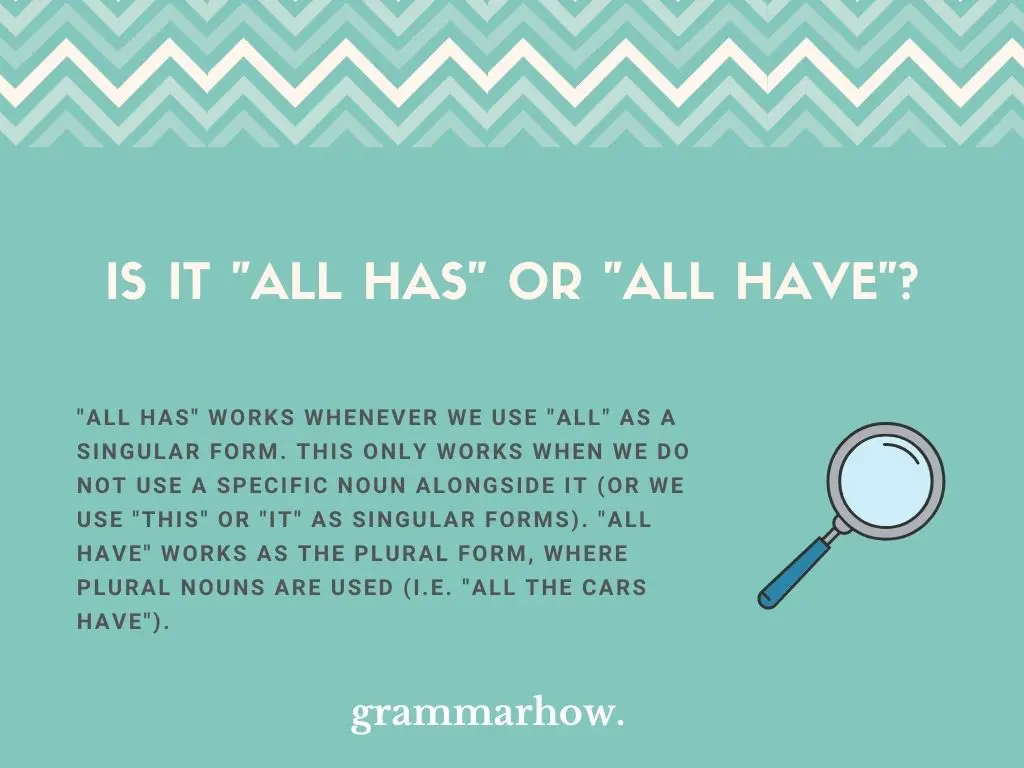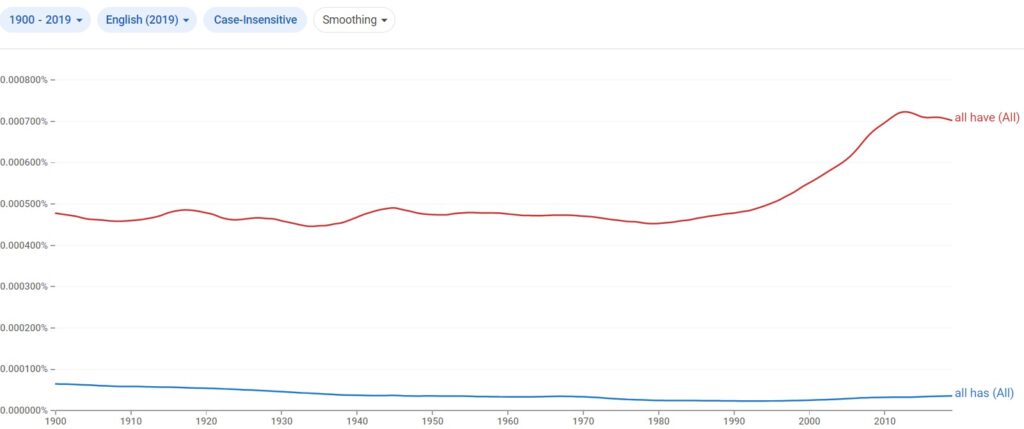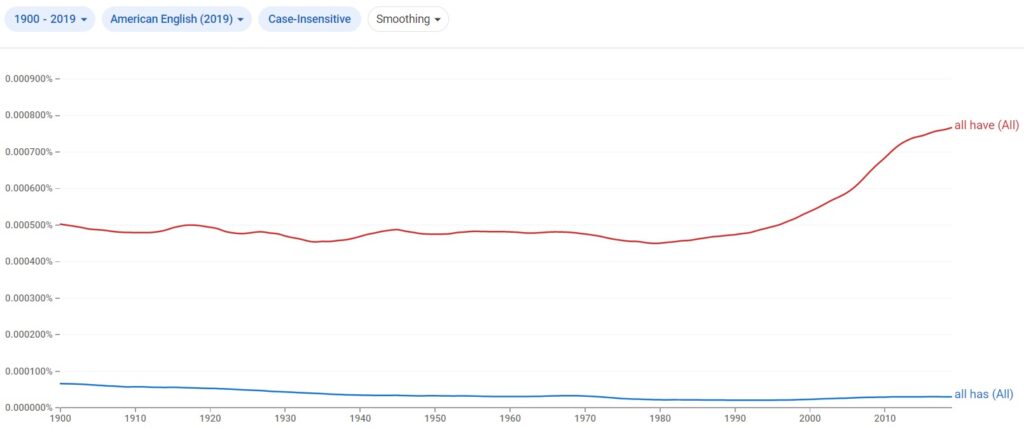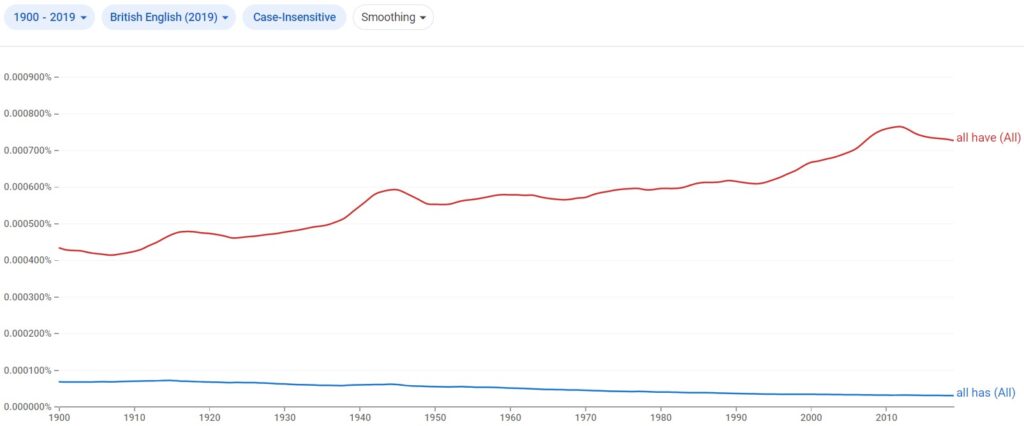“All” is an interesting word. It comes in both a singular and plural form. It would help to know when each form applies because it plays a large part in determining whether “has” or “have” is the more appropriate verb form.
Is It “All Has” Or “All Have”?
“All has” works whenever we use “all” as a singular form. This only works when we do not use a specific noun alongside it (or we use “this” or “it” as singular forms). “All have” works as the plural form, where plural nouns are used (i.e. “all the cars have”).

“All have” is more general, and you’ll typically find more common uses for it. It works better to use “have” with plural nouns. While “has” is also grammatically correct for singular entities, it’s not common for anybody to find a good way to work “all has” into a sentence structure.
When Should I Use “All Has”?
“All has” is not popular, but it is grammatically correct. We use it when “all” is treated as a singular form or collective noun. However, contextually, people prefer to use “have” when using “all” because it more generically refers to plural forms of some kind.
- All has been forgiven. You may return to your classroom now to make sure you don’t miss anything.
- All of this has not been lost. You just have to keep looking. I believe that you’ll find it if you try hard enough.
- This all has got to go. We can’t keep it all around here because it reminds us of the harsher times.
- This all has no place here. We want you to make sure it’s gone by the morning.
- All it has left are a couple of items. You shouldn’t try to take those away.
- It all has to be here somewhere. I know that we’ll find it. We just have to keep looking.
- Has all of it been accounted for? I can’t find a list of it anywhere.
When Should I Use “All Have”?
“All have” is the most popular choice of the two forms. We typically use “all” as a plural form when using the verb “have.” This is because it applies to more contexts, where “has” might not work as well.
Sometimes, there aren’t any specific rules that teach us what does (or doesn’t) work. The only thing we have to go by is contextual understanding and semantics.
Basically, if native speakers think “all have” sounds better, then “all have” is going to be more popular. It just works in more scenarios, which is why it tends to be the better choice.
- All of them have forgotten their manners. I wish there was something we could do about that.
- All of us have been here before. I knew it was going to be an important place to go.
- All have been ignored. I’ll make sure to delete further messages if they keep coming through.
- All of these have been moved to the next best candidate. We hope they will be able to take it on.
- All the doors have green handles. I don’t know why I know that, but I do.
- I think that all of them have a lot to answer for. You should question them as soon as you can.
- All of them have got to go. I can’t stand the sight of them!
Is “All Has” Or “All Have” Used The Most?
According to Google Ngram Viewer, “all have” is by far the most popular choice. This makes it very clear that native speakers much prefer to use “all” as a plural form whenever it’s accompanied by the verb form “have.”

With that said, “all has” does still work. However, it’s not a popular choice (which this graph makes clear). You’ll have a hard time finding suitable contexts where it works with the “has” verb form.
Is It “All Has Been Done” Or “All Have Been Done”?
“All has been done” works when we use “all” as a collective noun. This usually only applies when we use “all” to generally refer to “everything” rather than a specific collection. “All have been done” refers to more specific things, where “all” can be narrowed down within a context.
- All has been done at this stage. It’s time to leave.
- All have been done, and I will not continue to work on any of them.
Is It “All People Has” Or “All People Have”?
“All people have” is the only correct form. “All” works best with “people,” which is a plural form. Therefore, it makes sense to stick to the plural verb form, which means that “have” is going to be the only good option. “All people has” is grammatically incorrect.
- Correct: All people have a duty of care for this issue. I want to make sure that’s kept in place.
- Incorrect: All people has to take part in this. I don’t want anybody to be missing out on it.
Is It “All Of Us Has” Or “All Of Us Have”?
“All of us have” is the only correct form. We use “have” here because “us” is a plural form used to reference a group of individuals. It makes sense to use “have” with “us” because it signifies that multiple people are involved. “Has” does not work.
- Correct: All of us have a game to plan for. Please make yourself at home, but we have to keep busy.
- Incorrect: All of us has this problem to sort out. Do you have any ideas that might help us through it?
Should I Use “All Has” Or “All Have” In American English?
According to Google Ngram Viewer, “all have” is vastly more popular in American English. Yet again, we see that context is important, and “all has” simply doesn’t apply to enough contexts to warrant its use in American English.

Should I Use “All Has” Or “All Have” In British English?
The same is also true of British English. According to Google Ngram Viewer, “all have” is the only useful choice. It applies to the most contexts, which is why so many native speakers will stick to “have” as the correct verb form.

You may also like:
All Is or All Are – Is “All” Singular or Plural?
“All Was” or “All Were” – Correct Version (With Examples)

Martin holds a Master’s degree in Finance and International Business. He has six years of experience in professional communication with clients, executives, and colleagues. Furthermore, he has teaching experience from Aarhus University. Martin has been featured as an expert in communication and teaching on Forbes and Shopify. Read more about Martin here.
